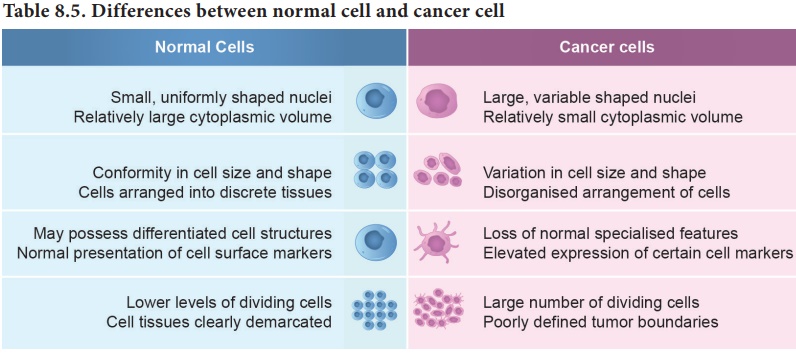Immunology - Tumour immunology | 12th Zoology : Chapter 8 : Immunology
Chapter: 12th Zoology : Chapter 8 : Immunology
Tumour immunology
Tumour immunology
A tumour or neoplasm is a group of
cells whose growth has gone unchecked. When a tumour continues to grow and
invades healthy tissue, it is called cancer. They spread to other parts of the
body from the tumour and give rise to secondary tumour. This is known as metastasis.
Tumour may be benign or malignant depending on its characteristics. Benign or
non-cancerous tissues are capable of indefinite growth and do not invade other
body parts. In the malignant tumour, the cells grow indefinitely, detach and
migrate into healthy surrounding tissues.
In normal cells, cell growth and differentiation
is highly controlled and regulated. But in cancer cells, there is breakdown of
this regulatory mechanism. Normal cells show a property called contact
inhibition, which inhibits uncontrolled growth. Cancer cells do not
have this property. As a result, cancerous cells divide continuously giving
rise to mass of tissues called tumours (Table 8.5).

When a cell undergoes malignant transformation,
it acquires new surface antigen and may also lose some normal antigens. These
antigens are present on the membranes of malignant cells and they induce an
immune response. Both humoral and cellular responses can be observed in
malignancy. Cancer cells can avoid immune detection as they are not foreign
bodies but are abnormally functioning body cells. This makes them difficult to
treat.
The concept of immunological surveillance
postulates that the primary function of the immune system is to “seek and
destroy” malignant cells that arise by somatic mutation. The efficiency of
the surveillance mechanism reduces either as a result of ageing or due to
congenital or acquired immunodeficiencies, leads to increased incidence of
cancer. Thus, if immunological surveillance is effective, cancer should not
occur. The development of tumour represents a lapse in surveillance.
Immunotherapy of cancer
Immunotherapy also called biological therapy uses
substances made by the body or in a laboratory (monoclonal antibodies) to
improve or to resist the immune system function. Different approaches have been
attempted in the immunotherapy of cancer. Immunotherapy appears to be important
in getting rid of the residual malignant cells after the gross tumour has been
removed. The best results in the treatment of cancer is to follow an integrated
approach to therapy, combining surgery, radiotherapy, chemotherapy and
immunotherapy.
Scope of Immunology
The younger graduates in this field can find
number of employment opportunities in Government as well as private hospitals.
The scope of the immunology is immunotherapy, microbial immunology, clinical
immunology, cellularimmunology,allergyandimmunology, translational immunology,
transplantation immunology, neuro-inflammatory disorders, tumour immunology,
vaccine immunology, inflammatory disorders, ocular immunology and inflammation.
Related Topics